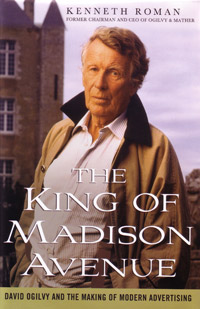The King of Madison Avenue
The King of Madison Avenue
By Kenneth Roman

Learn how David Ogilvy got started with some of his most memorable campaigns, including The Man in the Hathaway Shirt, the Schweppes guy and Dove soap.
Q&A with Author Ken Roman
Did anything in the research surprise you?
I worked with Ogilvy for 26 years and knew him even longer, so I knew his story well. But I now understand him better – the influences on his life, what motivated him, how he accomplished what he did.
My research – more than 180 interviews, 30,000 papers in the Library of Congress (plus other libraries), visits to his schools in England and Scotland and his homes in Lancaster County and France – added missing pieces to what I knew, and provided dimension.
How did Ogilvy change the landscape of the advertising world, and what made him such a powerful influence?
He created advertising that was considered breakthrough at the time – the eye patched Man in the Hathaway Shirt, Commander Whitehead for Schweppes, the most famous headline in the car business for Rolls-Royce, beautiful ads for Puerto Rico that changed the image of the country. His advertising brought civilized good taste to the business.
But his contributions to the business are far larger. He championed the now-ubiquitous concept of brand image. He made the business more professional – using research to guide the development of ads, building a body of knowledge, leading the industry toward payment by fees instead of commissions. He was ahead of his time in embracing direct marketing. He reminded others of the purpose of advertising – to sell rather than just entertain. He was an early consumerist – preaching honesty in advertising, lobbying against billboards, refusing to do political advertising (and later, cigarette ads). He laid the foundation for a global brand – Dove. His most visible legacy is Ogilvy & Mather, still one of the most respected agencies – after a hostile takeover and the founder’s retirement, with his name still on the door.
Was he liked?
He had hundreds of friends, in the business and elsewhere. He was fun, charming, colorful, provocative, interesting – and interested in others, and they responded. He was liked as well as respected by almost everyone.
How did the irregular aspects of his background influence his life in business?
He drew upon almost every experience, and described their influence on him in books, speeches and interviews. Working in a French kitchen taught him high standards. Selling kitchen cookers door to door taught him that advertising must sell rather than entertain. Working for George Gallup taught him the benefits of consumer research. He seldom spoke of his work in British intelligence. He talked frequently about his life as a farmer. Neither appears to have influenced his life in business.
What was the most important lesson you learned from working with him?
Above, all, high standards. After that, humanity, good writing, and a sense of humor.
What was his most successful advertising campaign?
While most people associate him with the eye patch for Hathaway shirts, few credit him with the success of Dove, now the largest selling soap brand in the world. He created the proposition for its success – one-quarter cleansing cream, to keep skin looking younger.
Did Ogilvy choose you as one of his successors?
No, although he might have been able to veto that decision; he was retired at the time. My boss and predecessor Bill Phillips probably made the call, after discussing it with Jock Elliott (his predecessor) and Ogilvy – and with key Directors on the Board. I had successfully run Ogilvy & Mather agencies at every level – New York, U.S. and O&M Worldwide. I was responsible for building our largest worldwide accounts – American Express, Unilever, General Foods, Kimberly-Clark. I had written two books that were recognized in the business. And I embraced the values of the company.
Why did you write this book?
I had two purposes in writing this book – to place Ogilvy in advertising history, and to bring him alive as a personality. He made more substantive contributions to the business than any other single individual, and was one of the most memorable people I have ever met.
Thank you to Ken Roman and Palgrave Macmillan for allowing aef.com to share this information with our users. To purchase a copy of the book, click here.
Ken Roman
Copyright © 2009 Palgrave Macmillan. All rights reserved.






